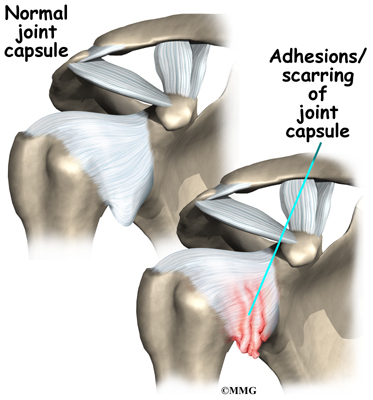As always, feel free to comment or e-mail if you have any questions!
The truth about frozen shoulder

Shoulder pain is a very common problem affecting Canadians. There are a diverse range of tissues that can become injured and lead to shoulder pain including; muscles, ligaments, nerves and even cartilage within the joint.
However, there is another relatively common source of shoulder pain that seems to be poorly understood and is often misdiagnosed. This condition is referred to as ‘frozen shoulder’ or ‘adhesive capsulitis’.
Adhesive capsulitis affects 2-5% of the general population, but affects anywhere between 10- 34% of people who suffer from diabetes or thyroid conditions.
Common symptoms of this disorder include pain and/or reductions in range of motion that get progressively worse, sharp pain with certain movements, and an abnormally hard or abrupt end feel when moving the shoulder.
This collection of symptoms, while concerning, does not mean you suffer from adhesive
capsulitis by necessity. Rotator cuff tears, fractures and even arthritis can present in a similar fashion. However, the key issue with adhesive capsulitis is the length of time it requires
to heal. In fact, research has shown that adhesive capsulitis can take anywhere between 18-24 months to completely resolve.
Throughout this time frame, the condition is typically divided into three phases. Stage one, otherwise referred to as the ‘freezing’ stage, is characterized by a progressive loss of range of motion of the shoulder and increased pain. Stage two, the ‘frozen’ stage, describes a period of time where the shoulder pain and range of motion reaches and remains at a plateau. Finally, the third ‘thawing’ stage is marked by range of motion that slowly improves, accompanied by gradually decreasing pain.
So, why does adhesive capsulitis take so long to improve? The honest answer is that scientists and doctors are not completely sure. Some studies have shown it is related to blood flow, and how your arm connects to the shoulder blade.
Surrounding the joint where the humerus connects to the shoulder blade, there is a bag
of connective tissue that contains a joint fluid to help facilitate smooth and frictionless
motion. Studies have shown that with adhesive capsulitis, there is a significant amount of inflammation and adhesions that build up between that joint capsule and the joint itself.
In order to be symptom free, the joint capsule must be detached from the underlying bones and heal fully. There is poor blood supply to these structures, and that partially explains why it takes so long for the capsule to return to normal, and for full motion to be restored.

Nobody wants to suffer for 18-24 months. So what can you do to help improve your recovery time? The first line approach should include conservative measures to help maintain and improve your range of motion. Shoulder mobilizations, soft tissue therapy and a strong commitment to a rehabilitation plan may help control symptoms and maintain function.
In more persistent cases, surgery may be worth considering. For example, surgeons may opt to enter the shoulder joint arthroscopically, and cut the adhesions between the capsule and underlying bones.
With whatever you chose to do, it is important to keep in mind there is no evidence showing one treatment to be better than the other. What may work for one person may have no impact on another.
Also, with this condition, it is very important to not get discouraged. While it is a long wait, one should keep in mind that most cases of adhesive capsulitis will get better on their own within 24
months.
Regular supplements and medication that are normally used to treat knee injuries can help in reducing some pain and inflammation. In some cases, they may even delay or avoid knee surgery. perimeter spine and rehab reviews
ReplyDelete